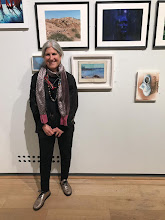 |
Near the Sea
|
We arrived in Lindisfarne just as it was safe to cross onto the island, Tuesday evening 6:30ish. Patrick and I hadn't left East Anglia since February and most of the time we were home or at a food shop five miles from our door. We had both wanted to go to Holy Island since seeing it from the window of car or a train on our many trips to Scotland. Louise Kirkbride organised a painting week with Mick Kirkbride teaching, and that was perfect.
There were five artists (plus Mick) and a few partners (jincluding Patrick) as well as Jacob, Lou and Mick's son. For a few others, Covid stopped play and they were missed.
I got ready for the trip by preparing a book to draw in. This title was appropriate, as I had been the NEAC Scholar and Mick had been my mentor. As I drew, I found that the words on the page were also apt and they became my titles. I have not finished the pages as I like to whiten the areas around the specific words I have chosen, I may try to resolve some of the drawings that haven't quite worked, yet, but I fear that my list is so long that may takes weeks so thought I'd show you my progress so far!
 |
In the Sedgy
|
This was my first drawing, made in the harbour; it was the perfect place to begin. I was determined not to dwell on my drawings. I can see some lobster pots but doubt you can...
 |
It Established its Right
|
This was my last drawing, looking across a pool of seawater in front of the lime kilns, with the castle to the left. Patrick and I were driving back to Suffolk. The water gave me a very hard time, changing from almost white to dark blue as the clouds went in and out.
 |
| Rain Near Priory |
Rain Near Priory was not made in my sketchbook. It was raining too hard and I worried that the wet might damage the drawings I had made earlier in the altered sketchbook. I faced the storm which pelted down rain and puddled the pastel. I used a rag to wipe everything off a few times when I thought the storm was abating, it never did while I sttod there. In the end I kept what I could and gave into the chaos, smudging with my fingers the pastels disintegrating in my hands.
 |
So Far as Distance Goeth
|
From the harbour you could look ahead and see the castle and the boats, look left and see the tussled hills and sheep, or look behind or right to see buildings. This is unfinished, delighting in one of the other less iconic views.
 |
| Standing at the Boundary Wall |
Standing at the Boundary Wall was made before Near the Sea. For me, one of the most striking things about the view was the blue, almost black, of water. People walked out onto the ledge and I could just see their stick figures in the distance. The tide was coming in as I finished the drawing and deciding where I should freeze it in time was one of those variables of plein air drawing that it's hard to get right, for me.
 |
Tales of the North Country
|
This is the only page I drew on in my second sketchbook, (same name). This was another quickie, to capture the flavour of the layers of landscape and the buildings I saw.
 |
The Opening
|
Our experience was that it rained when the tide came in and as the tourists raced to get home across the causeway. The opening was made as the rain died down, shortly after Rain Near Priory. When the rain returned and we were ready to head back I had only noted the gesture of the harbour from behind the Priory gate. It wasn't a really quick sketch, instead I held back defining it. The light was viscous. The following day there would be archeologists with the Big Dig on the other side of the wall.
 |
| The Sound of the Bell |
This was from the first morning of drawing. The tide went out, the tide came in and the confusion of what was water and what was mud is all too apparent!
 |
We Must Cross the Water
|
We were high up and the wind was blowing in my face. My hat blew off, but the downward road caught my eye and I unpacked my easel. I think the fixative made this even darker than it already was. The relationship between the wall and the water was constantly changing and my final marks made everything worse.
By the way, my new website is live. There are still quite a few improvements to make but let me know what you think in the meantime! https://www.rebeccaguyverart.com










































